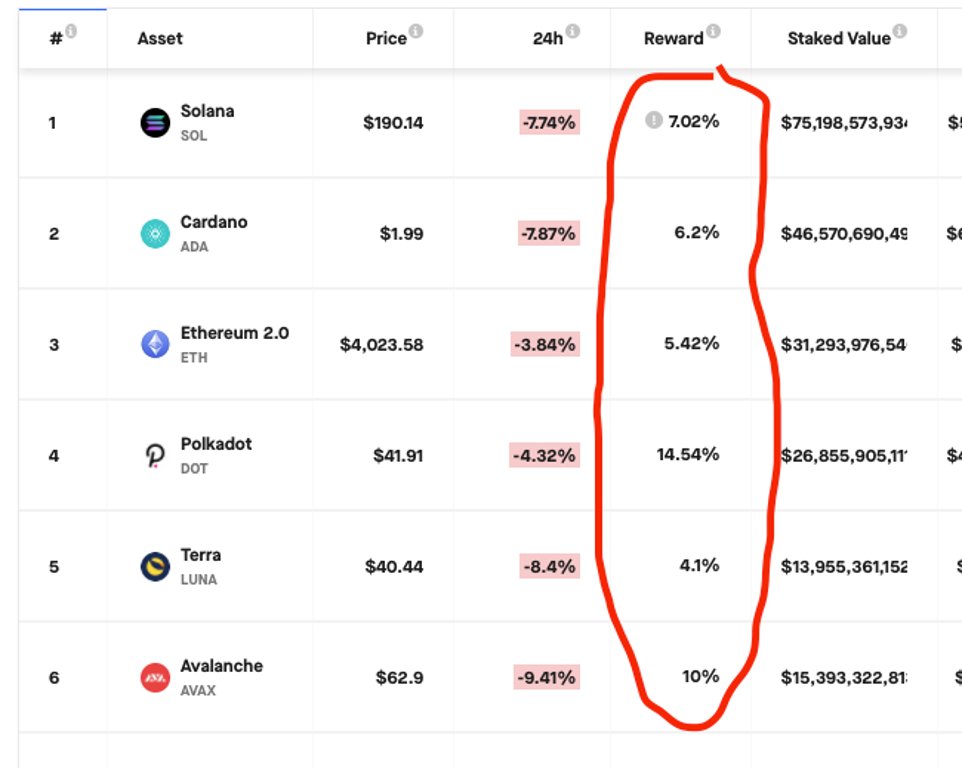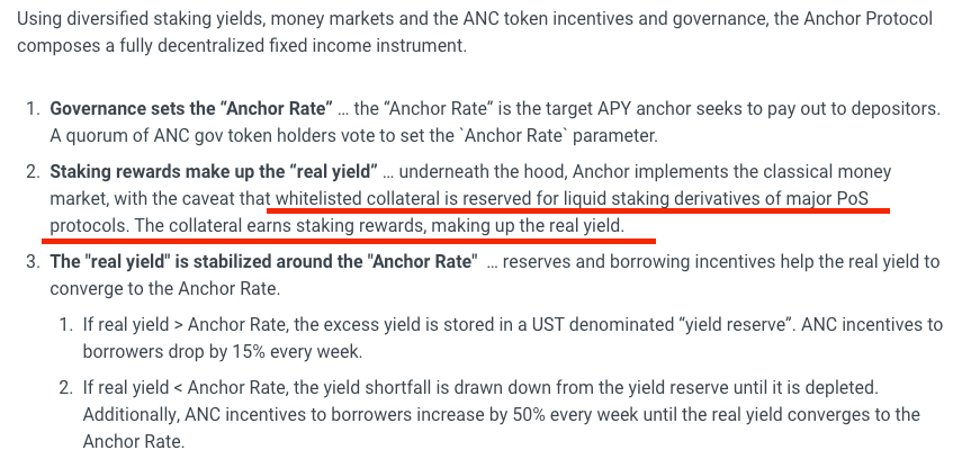
The surest bet in crypto:
Blockchain nations with proof of stake as their economic engine 👇
Blockchain nations with proof of stake as their economic engine 👇
There’re over 100 crypto projects that use proof of stake (PoS) as consensus mechanism. These account for $400 billion in market cap (not including ETH 2.0), or 15% of total crypto market cap.
About 40 of these are public smart contract platforms— the so called layer 1 chains— where decentralized apps run on top.
While competition is fierce & many layer 1s will die, it’s clear that multiple PoS layer 1 chains & their scaling layers will coexist in future, and become the collective floorboard of the metaverse.
But most do not grasp the huge economic implications of PoS, beyond its technical function for blockchain security.
If L1 chains are the new nation states w/ their own sovereign economic ecosystem, proof of stake is the foundational engine that enables healthy circulation of energy & values throughout the system.
https://twitter.com/RealNatashaChe/status/1453452516524392450?s=20
Let’s look at how this value circulation happens & why PoS is so important.
SMART CONTRACT PLATFORMS AS SOVEREIGN ECONOMIES
A growing L1 platform is a powerful blackhole absorbing financial liquidity.
If you want to get into the Ethereum nation, you need to buy ETH. If you want to enter the Solana nation, buy SOL.
A growing L1 platform is a powerful blackhole absorbing financial liquidity.
If you want to get into the Ethereum nation, you need to buy ETH. If you want to enter the Solana nation, buy SOL.
A L1 platform bootstraps its national economy through a flywheel btw financial speculation & real world usage:
Native token price going up—> attracting liquidity to the nation—> funding more apps to be built on its soil for more use cases—> attracting more real users & bigger network effect—> demand for native token increasing—> token price going up
In a sense this is nothing new. When a country’s economy grows quickly, exchange rate of its native currency tends to appreciate. It happened for USD in past 200 yrs, for Chinese yuan in past 20 yrs.
But this flywheel is inherently unstable.
But this flywheel is inherently unstable.
The token price, i.e. exchange rate, does not go up forever. If the flywheel can spin up when price goes up, it can spin down just as easily when price heads the other way.
In the “real world”, you call this business cycles, i.e. economies go through booms & busts.
In the “real world”, you call this business cycles, i.e. economies go through booms & busts.
Since people don’t like busts, we came up w/ ways to grow or shrink currency supply according to economic conditions, to try to smooth out recessions & booms. We call these clever tricks “monetary policy”.
If you want to stimulate the national economy, expand the money supply. As long as you don’t go overboard, it usually works.
Just like the Fed prints USD to get America out of Covid slump, new L1 chains like Solana & Avalanche issue more SOL & AVAX to get their economy going.
Just like the Fed prints USD to get America out of Covid slump, new L1 chains like Solana & Avalanche issue more SOL & AVAX to get their economy going.
(So many people shit on money printing & token inflation. They’re overreacting. Yes these tools have negative side effects. But when you have a tool that proves to work, you’d be an idiot to not use it.)
But here’s where blockchain nations & the Fed differ, aside from the programmability of their policies.
The Fed has to rely on tradFi (banks & shadow banks) to push its monetary policy out to the economy. But TradFi is a crappy pipe— clogged in places it should flow, leaking in places it should hold. You end up w/ many ugly imbalances in the system that catch you by surprise later.
In contrast, proof of stake gives blockchain economies a mechanism for monetary policy transmission that is more fair, more effective & more sustainable.
How?
How?
PoS AS A FOUNDATIONAL ECONOMIC ENGINE FOR BLOCKCHAIN NATIONS
The basic idea of PoS is simple. Blockchain rewards people for validating transactions. To make sure validators are honest, it requires them to lock up resources in the form of the chain’s native token, i.e. staking.
The basic idea of PoS is simple. Blockchain rewards people for validating transactions. To make sure validators are honest, it requires them to lock up resources in the form of the chain’s native token, i.e. staking.
While intended as a security mechanism, the economic implication of PoS is profound.
1. It gives citizens a sustained motive to hold the native token (besides the fact that you need the token for transactions within the nation).
1. It gives citizens a sustained motive to hold the native token (besides the fact that you need the token for transactions within the nation).
W/ proof of work, only miners get the rewards for processing transactions. The rest of holders are holding the token primarily b/c they expect price to go up.
That’s why PoW chains like bitcoin need to forever pump the narrative of ever increasing price & promote the religion-like mind control of HODLing culture to keep people interested. (it’s also a reason why BTC price will be always volatile & unfit as a unit of account).
PoS, in contrast, gives tangible economic incentive for holding besides price going up.
Even if you only have 1 SOL, you can earn a consistent yield through delegated staking. Liquid staking services like Lido & Marinade Finance make it even easier— there’s no longer a locked-up period for your staked tokens. Go in & out as you please.
This increases stickiness of citizenship, boosts price stability of everything denominated in the L1 token & lowers transaction costs in the nation.
2. It efficiently distributes economic output of the platform.
Traditionally the GDP of any market economy is distributed to its participants in two forms: labor income & capital income.
Traditionally the GDP of any market economy is distributed to its participants in two forms: labor income & capital income.
Labor income’s share in the economic 🥧 has been shrinking over past decades in all developed countries. 

This is the combined result of globalization, automation & tax policies. It leads to higher & higher wealth inequality, since labor is the main income source of the masses, while only a minority owns capital.
The labor-replacing technology progress in AI & robotics will exacerbate the trend in coming yrs— there’ll be a day when many can no longer rely on labor income alone to make a living.
The world is already abundant. But it needs new ways to distribute its abundant wealth. One solution is to enable more people to earn through capital incomes.
The staking mechanism of blockchain nations help achieve this in programmable ways.
The staking mechanism of blockchain nations help achieve this in programmable ways.
Part of staking yields of L1 tokens comes from transaction fees collected by the platform.
The blockchain nation takes a cut in every economic activity happening on its soil & give it to its citizens, either directly as staking reward or indirectly through burning txn fees, which supports token price.
This allows everyone that participates (read: stake) in the platform to share the output of its economy as non-labor earnings. It's capital income for the masses.
And in case not obvious, it’ll take yrs for governments of traditional nations to implement any type of universal basic income.
But the blockchain nations are already doing this (sort of) w/ staking. Staking participation rates on L1s like Solana & Fantom are well over 60%— the majority of citizens in these economies are getting a capital income.
(BTW, like this so far? I write about ideas on investment, macro and human potential. Subscribe to my newsletter for updates 👉 taschalabs.com/newsletter)
3. It turbocharges monetary policy transmission.
Another part of L1 staking yields comes from new token emissions, i.e. the platform “prints” money & drops it to citizens’ pockets directly.
Another part of L1 staking yields comes from new token emissions, i.e. the platform “prints” money & drops it to citizens’ pockets directly.
This is a lot more powerful than the Fed’s monetary policies which have to be tricked down through the high-friction banking system that benefits some a lot more than others.
4. It provides a base ingredient for new financial industry.
The major L1s’ staking APYs are ranging from 4% to 15%. These are more attractive than saving rates of banks & more stable than yield farming in DeFi. PoS thus forms the foundation for other financial products to build on top. 

DeFi products like Anchor are already using L1 staking on backend to offer saving rates on stablecoins of close to 20%. 

Other products offer “self-repaying” loans or lower loan liquidation risks by staking the collaterals from borrowers in PoS chains.
This is only the beginning of a new financial system where L1 staking yields will provide the reference rate for every other financial product in their ecosystem.
https://twitter.com/RealNatashaChe/status/1427344424074301473?s=20
TLDR:
1/ Smart contract platforms are the new nation states
2/ Proof of stake drives crypto national economies
3/ PoS supports price stability, enables capital income for the masses, creates powerful monetary policy & offers building block for new financial system
1/ Smart contract platforms are the new nation states
2/ Proof of stake drives crypto national economies
3/ PoS supports price stability, enables capital income for the masses, creates powerful monetary policy & offers building block for new financial system
Like this? Don’t forget to
• retweet
• follow me for more ideas to help you become smarter, richer, freer 👉 @realnatashache
Questions? Thoughts? Put in the comments & I’ll address the interesting ones in future posts.
• retweet
• follow me for more ideas to help you become smarter, richer, freer 👉 @realnatashache
Questions? Thoughts? Put in the comments & I’ll address the interesting ones in future posts.
• • •
Missing some Tweet in this thread? You can try to
force a refresh




